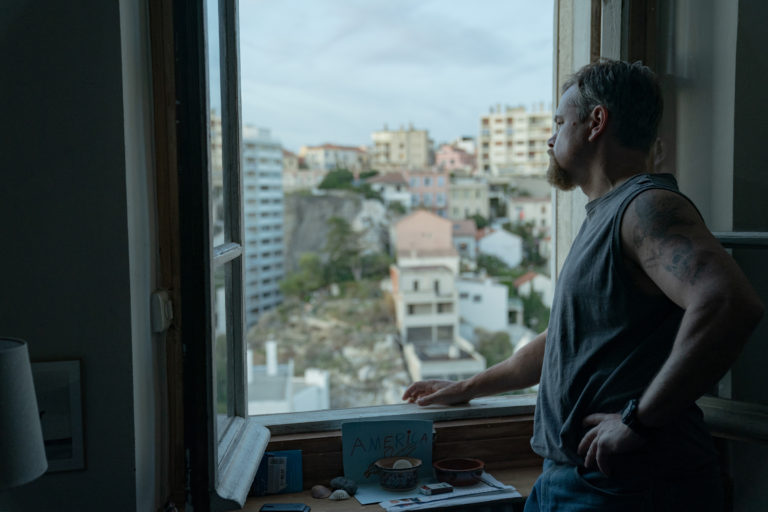Stillwater (2021 | USA | 138 minutes | Tom McCarthy)
Although director Tom McCarthy borrows loosely from the story of Amanda Knox’s overturned conviction for the murder of Meredith Kercher, Stillwater is hardly a ripped-from-the-headlines docudrama. Instead, he wisely takes inspiration from the situation of a woman whose study abroad ends with imprisonment for a gruesome murder she claims not to have committed as the jumping-off point for a different kind of tragedy in three acts.
Distancing the film from the actual events that captivated the world (or at least certain corners of it), McCarthy and screenwriters Marcus Hinchey, Thomas Bidegain, & Noé Debré transpose the international action from Perugia to Marseilles and swaps Seattle for unspecified Oklahoma. There, we meet underemployed roughneck Bill Baker (Matt Damon and his striking goatee) works short-term construction gigs while looking to find his next gig on an oil rig. His unshowy portrait of a working-class everyman includes a Southern accent, endless supply of Carhart plaids, a well-worn ballcap that leaves his head only for nightly prayers over Sonic takeout. Between jobs, he pays a visit to his mother-in-law, picks up a few mementos from home, and hops on a plane to visit his daughter Allison (an all-grown-up Abigail Breslin) in France.
Another movie might choose this visit to set-up a baseline of tranquility and watch it all fall apart through a salacious investigation and court case, but McCarthy makes a wise decision to skip over all of that, dropping the audience into the middle doldrums of Allison’s long sentence (in this heightened version, she is serving time for the killing her lover while maintaining her innocence) in a women’s prison. By setting up expectations and then allowing them to crumble, the film demonstrates a trust for its audience by deciding what to show, what to withhold, and parceling out revelations and background material at its own pace. This naturalistic storytelling style ultimately worked for me, but Stillwater has the feeling of either not knowing exactly what kind of film it wants to be or knowing exactly that it wants to be three movies in one.
The first act takes the form of an overconfident American Abroad, with Damon’s character holing up in a generic business hotel for a couple of weeks while visiting his daughter. Despite her being five years into a ten-year prison sentence, he speaks nary a word of French and has little sense of the city’s geography or cultural nuances. Instead, he makes matter-of-fact trips to the prison and eats at Subway every night. Their interactions hint at a disconnect and sense of estrangement, the details of which are gradually unfurled over the course of the film. Most importantly, one conversation includes a spark of hope via a new tip that might finally exonerate Allison while also providing insight into the daughter’s lack of trust in her father, setting off a frustrating journey through France’s legal bureaucracy as well as a D.I.Y. detective story. As Bill delves into the various strata of the port city’s diverse socioeconomic landscape, cinematographer Masanobu Takayanagi vibrantly conveys a real sense of place across the city’s cafes, picturesque vistas, well-lived interiors, and gritty exurbs.
Damon portrays Bill’s limits as a father and citizen abroad, clearly communicating his determination to do right by his daughter, but also as someone on a quest to redeem himself. He eventually comes to rely upon the translation and navigational assistance of a local actress (Camille Cottin, way too glamorous) whose acquaintance he made at the hotel by way of helping her eight-year-old daughter Maya (Lilou Siauvaud, just on the right side of too-cute). It’s here that the story shifts gears into a quiet domestic drama, with Bill rooming with the single mother in exchange for light home repairs and occasional childcare duties. By slowing down the pace and allowing us to watch Bill building a new life for himself, the film establishes a sense of investment in his character and an acknowledgement that the course of justice is rarely swift or straightforward.
In this long interlude, we get to see Bill figuring out himself as well as some lovely interludes that feel like the first time father and daughter have ever seen each other as fully-formed adults. During one of these conversations, on a picturesque cliff overlooking the sea, you can feel Damon communicating his character’s understanding of why Allison moved there (“it was very far away”) and coming to terms with her disappointment in him. This sweet middle act also includes a pretty cute hand-off between former child star Breslin and charismatic scene-stealer Siauvaud.
Much of this, of course, exists to set up the stakes when inherent fuck-up Bill finds himself in a position to make a truly awful decision. By the time it gets to this big dumb choice, we’ve spent enough time with Bill, seeing him repeatedly disappoint and reconcile with his daughter and fall into a comfortable and trusting new relationship. So it feels earned when the plot suddenly threatens to pull all of those gains away by shifting into yet another new gear, casting the action into a suspenseful, dread-soaked climax.
It takes a bit of surrender to the Stillwater’s odd rhythms, but by the time it dispenses with the thriller elements to find a melancholy and reflective coda, I found myself won over by the choice not to stage this as a traditional potboiler. It requires some patience, but its about both the journey and the destination.
After premiering at the Cannes film festival, Focus Features releases Stillwater in theaters on July 30.



